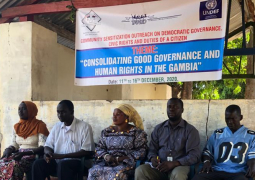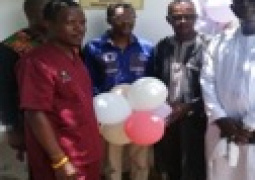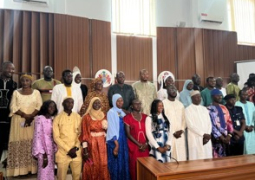
The project procured these laptops with a view to facilitating the work of the 18 IPs in the country to help minimiswe their technology gaps. GIRAV is a five-year project funded by the World Bank through a grant of US$40 million. The project is aimed at promoting the development of inclusive, resilient, and competitive agricultural value chains, with specific focus on smallholder farmers and agribusinesses in The Gambia. The Ministry of Agriculture is the project’s executing agency and it is being implemented by the Central Project Coordinating Unit (CPCU) of the Ministry in close partnership with 18 IPs.
At the handing over ceremony held at the Kairaba Beach Hotel, Dr. Demba Sabally, minister of Agriculture, described the ceremony as a great moment for the ministry and the sector at large.
The gesture, he went on, is a clear demonstration of his ministry’s drive of transforming the sector from subsistence smallholder farming to commercial and digitalised data-driven for national food security, nutrition and economic growth as enshrined in the national development plan.
“This is the central pillar in our second-generation agricultural investment plan and as envisaged by His Excellency the president, Adama Barrow. As the project is going digital, these items are meant to support the IPs to improve on their information technology needs with regards to data collection, storage, processing, analysis and reporting”, he noted, while imploring the heads of the beneficiary institutions to assign the laptops to the project’s focal points.
Dr. Sabally recalled that the project’s 2022 seed programme, which enabled over many farmers in the country majority of whom are women and youth was meant to ensure access to high quality certified climate smart seeds including 200 metric tonnes of rice of different varieties and 50 metric tonnes of maize of different varieties.
“As far as productivity is concerned, preliminary analysis from the seed programme shows that yields per hectare has doubled from a baseline of 2 metric tonnes per hectare to about 5 to 6 metric tonnes per hectare for rice and an average yield of 4 to 5 metric tons per hectare of maize.”
Minister Sabally indicated that in 2022 the GIRAV project procured and handed over to the Department of Agriculture 100 tablets and 50 motorcycles meant to facilitate the work of the extension workers in data collection, storage, processing, analysis and reporting as well as to facilitate mobility for effective delivery of extension services in the field.
“However, this support alone goes to underscore the importance the Ministry and project attaches in digitalizing its interventions being implemented by the IPS.”
He thus urged the beneficiaries to be true to the mission, which he said, is to collect real time agricultural data and report it on time to the project.
He expressed his ministry’s unwavering commitment to further help build capacities of IPs in Monitoring and Evaluation, social issues, agronomic practices as well as on digital data collection, storage, processing, analysis and reporting.




